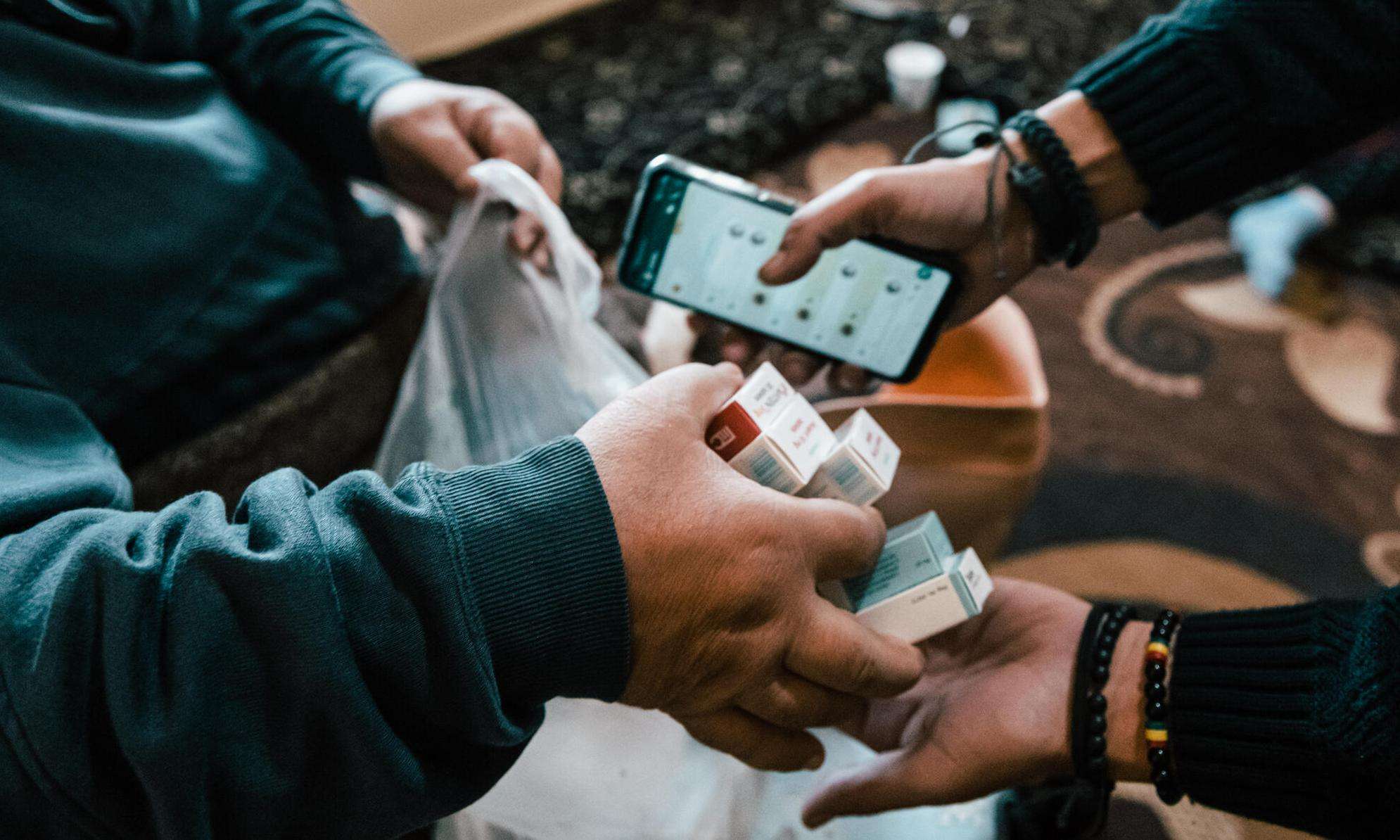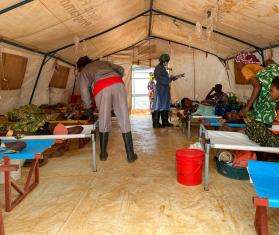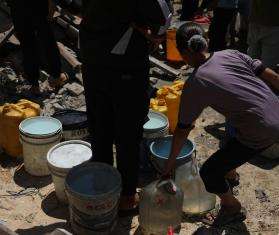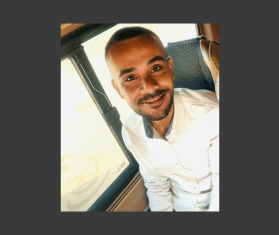Managing diabetes is complicated. Even with access to the best tools and technology, it requires constant blood sugar level monitoring and daily treatment in the form of medication or insulin.
Without access to sustained, affordable care, diabetes can quickly become complicated and life-threatening. Displacement, conflict, and the decisions drug manufacturers make can all impact whether a person with diabetes can access the care they need.
Here, three Doctors Without Borders/Médecins Sans Frontières (MSF) patients with diabetes share what it’s like to lose access to the medical tools they rely on due to corporate decisions, displacement, and conflict.
Corporate decisions on insulin pens
Only three pharmaceutical corporations—Eli Lilly, Novo Nordisk, and Sanofi—control 90 percent of the entire insulin market. This means they can set prices as high as they wish and decide which insulin and delivery devices are on—or off—the market, significantly impacting the lives of people living with diabetes all over the world.
Corporate decisions have resulted in a double standard in diabetes care, in which insulin pens and newer diabetes medicines that can simplify treatment and reduce complications are unaffordable or simply unavailable in low- and middle-income countries, despite being accessible in high-income countries.
“When I started using the pen, it was so much nicer because all I needed to do was just twist it, inject, and there you go,” says Lecritia Gladys Roberts. “But now it’s going to be such a different thing to go back to having the vials and the syringe.”
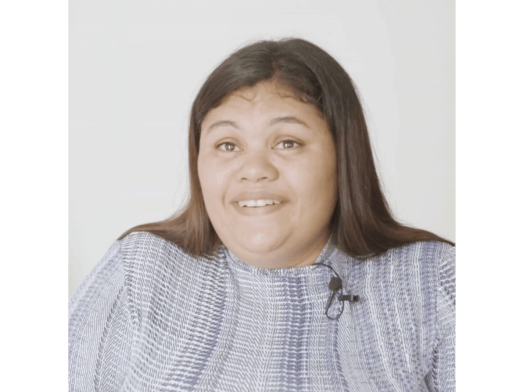
© MSF
Lecritia was diagnosed with type 1 diabetes in 1999. At first, she managed her diabetes with insulin injections from vials. However, she found the vials and syringes painful, cumbersome, and stressful. Insulin is expensive, so a dropped, broken vial could mean having to ration or go without insulin until she could buy more.
She explains: "The main fear is having those vials break, because what am I going to do? There’s no backups. Insulin is quite expensive. So if that vial breaks, you’re going to be crying.”
Lecritia was happy to begin using insulin pens when South Africa introduced them nationwide in 2014. Insulin pens are easier to use, less painful, more accurate, and more durable than vials and syringes—helping to improve quality of life for people with diabetes.
However, in 2024, Novo Nordisk announced it was completely stopping its production of human insulin pens, the main type of insulin pen available in South Africa. This forced many people with diabetes to change the way they administer their lifesaving medication with little warning, leaving governments scrambling to provide enough insulin delivery tools to fill the gap.
Although Novo Nordisk has—as of July 12, 2025—committed to supply analogue insulin pens in South Africa, the price tag is too high at $3.95 per pen, and will not result in equitable access for everyone with diabetes in South Africa. In order for the South African government to supply analogue insulin pens to everyone who needs them, Novo Nordisk must reduce the price.
Managing diabetes on the move
Fleeing your home often also means leaving behind a reliable supply of insulin. Some people with diabetes end up rationing their supply or even going without, risking severe health consequences or even death.
“When the insulin in vials I carried with me on my journey ran out, I tried to buy some more, but it was too expensive,” says Ghassan Fakhri Jabar. In 2009, when still living in Gaza, Palestine, Ghassan was diagnosed with type 2 diabetes. He managed his diabetes with medication and insulin injections from vials, and felt his life and disease were under control.
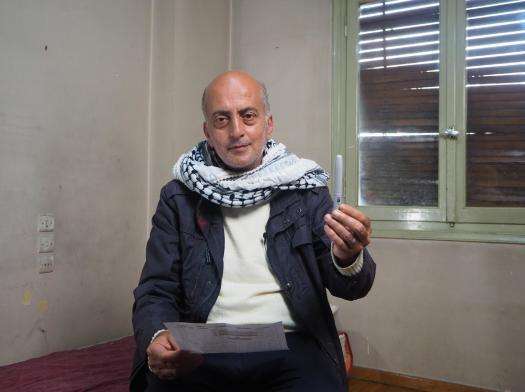
Greece 2024 © MSF
“When the insulin was unavailable, I tried to adjust to my circumstances; I reduced my food intake and exercised and walked around in order to try to keep my blood sugar levels down."
In 2022, Ghassan decided to leave Gaza to join his sons and seek asylum in Europe. What followed was a difficult eight-month journey from Gaza through Türkiye to Greece. Cut off from his regular insulin supply and unable to maintain proper blood sugar control, Ghassan endured dangerous glucose fluctuations leading to life-threatening diabetic comas, all while navigating treacherous migration routes.
After months without access to a sustainable insulin supply, he arrived in Athens, Greece, where he connected with MSF teams who provided him with insulin pens and closely monitored his condition.
On migrating with diabetes, Ghassan explains, “It would have been so much easier for me with pens, which are convenient, and the injection is light and painless.”
Navigating diabetes tools amid conflict
Living through conflict and its consequences can heighten stress levels which, for people with diabetes, can lead to dangerous blood sugar fluctuations. If left untreated, this can cause health complications like heart disease, blindness, and nerve damage.
Conflict and war come with vast and catastrophic consequences, including overstretched health care systems, medical facility closures, and supply chain disruptions, all of which can limit access to and availability of essential medical tools and treatments. In some contexts, people may be displaced and unable to access their public health facilities, or facilities may close or face shortages, meaning that people have to purchase what they need at high prices, find more affordable alternatives, or go without.
"The war was a very stressful period, and my blood sugar would go up, but I would try to ration what we had,” says Sana Ghannam, who is 14 years old. “We had very little medication. Sensors, which are costly, have become impossible for us to afford after the war.”
Sana has been a patient at MSF’s clinic in Baalbek-Hermel, Lebanon since she was diagnosed with type 1 diabetes in 2021. As part of MSF’s diabetes management in Lebanon, Sana was using continuous glucose monitoring (CGM)—what she calls sensors—to keep track of her blood sugar levels, which she was able to access for free through MSF’s clinic. Sana liked using CGM, as she was able to monitor her blood sugar levels independently and inconspicuously.
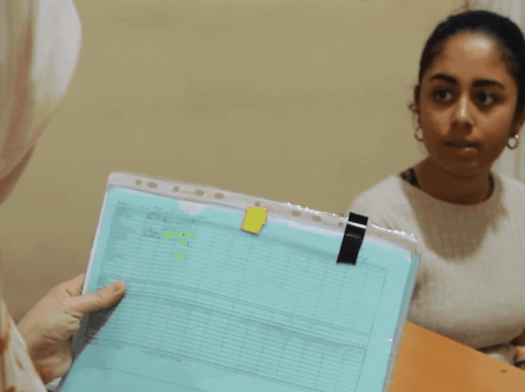
Lebanon 2025 © MSF
However, when the war in Lebanon broke out in September 2024 amid an ongoing economic crisis in which people were already struggling to obtain medical care, Sana’s diabetes management changed drastically. The war disrupted access to free CGM supplies, and this meant that people had to either buy these expensive supplies on their own or switch to more affordable diabetes management tools.
In Sana’s case, she changed the way she monitored her blood sugar levels, switching from CGMs to finger-prick devices, which are more affordable but she finds painful and stressful to use, especially as needles make her nervous. Additionally, finger-prick glucose testing must be done five times a day, which can be an additional barrier to keeping up with blood glucose measuring as the devices are not discrete and require the use of an additional machine.
Now that she’s using a device that she’s less comfortable with, Sana often goes an entire school day without measuring her blood glucose levels. This can be dangerous, especially as increased stress levels can raise blood sugar levels and—if unmanaged—lead to dangerous health complications.
“Sensors [CGMs] are the best solution, because I can monitor and keep track of it myself, I don’t need someone to measure for me or remind me to keep doing it,” says Sana. “With a sensor, I was much more regulated. I would check every 30 minutes.”
